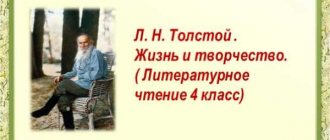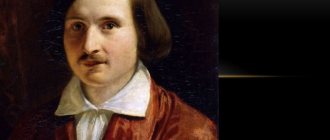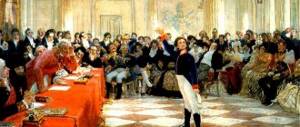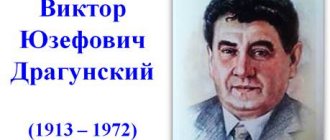Mikhail Mikhailovich Prishvin Russian writer (1873-1954) - presentation
Mikhail Mikhailovich Prishvin Russian writer ( )
The name of Mikhail Mikhailovich Prishvin is familiar to everyone since childhood. We know him as a lover of nature, a keen connoisseur of the beauty of Zalesye, Pereyaslavl region. The name of Mikhail Mikhailovich Prishvin is familiar to everyone since childhood. We know him as a lover of nature, a keen connoisseur of the beauty of Zalesye, Pereyaslavl region.
Prishvin M. M. was born on January 23. Prishvin M. M. was born on January 23 (February 4), 1873 in the village of Khrushchevo, Yelets district, Oryol province, into a merchant family. (February 4) 1873 in the village of Khrushchevo, Yelets district, Oryol province, in a merchant family.
The father squandered his fortune and the family was left without a livelihood. He died when Mikhail was 8 years old. The children received their education thanks to their mother. The father squandered his fortune and the family was left without a livelihood. He died when Mikhail was 8 years old. The children received their education thanks to their mother. After graduating from a rural school, he entered the Yeletsk classical gymnasium. In 1885, Prishvin and his fellow high school students tried to escape to Asia. Many years later, he said that this was his first desire to achieve his dream. After graduating from a rural school, he entered the Yeletsk classical gymnasium. In 1885, Prishvin and his fellow high school students tried to escape to Asia. Many years later, he said that this was his first desire to achieve his dream. Prishvin's mother - Maria Ivanovna
In his studies, Prishvin was lucky and unlucky at the same time. His geography teacher was Vasily Vasilyevich Rozanov, who would soon become known throughout the world as an outstanding Russian philosopher. Rozanov defended the boy from a hail of ridicule after an unsuccessful escape to Asia. But it was after Rozanov’s insult that Prishvin was expelled from the gymnasium without the right to enter another educational institution with a wolf ticket. When Prishvin was sixteen years old, he was fond of reading illegal, that is, prohibited literature.
| Buy an apartment in Moscow The situation on the real estate market. Buy an apartment in Moscow, discounts for buyers www.007dom.ru |
Having moved to Tyumen to live with his uncle, Mikhail graduated from 6 classes of the Tyumen Real School. In 1893 he entered the Riga Polytechnic (chemical and agronomic department). In 1897 he was arrested for revolutionary activities and exiled to his homeland in the city of Yelets ( ). Having moved to Tyumen to live with his uncle, Mikhail graduated from 6 classes of the Tyumen Real School. In 1893 he entered the Riga Polytechnic (chemical and agronomic department). In 1897 he was arrested for revolutionary activities and exiled to his homeland in the city of Yelets ( ).
In 1900 Prishvin left for Germany, where he graduated from the agronomic department of the Faculty of Philosophy of the University of Leipzig. In 1900 Prishvin left for Germany, where he graduated from the agronomic department of the Faculty of Philosophy of the University of Leipzig.
“In his distant youth, Prishvin fell in love with a student girl: it was abroad. The young man was not yet ready to realize active love: falling in love was only a pretext for his poetic flight. The bride, with feminine insight, understood everything and refused. He returned to his homeland. An aspiring scientist, he abandoned science and plunged headlong into art. The bride remained in England, withered and withered as a bank clerk. On the verge of mental illness, suffering from loneliness, constantly thinking about his lost bride, Prishvin marries a simple, illiterate “first and very good woman” and lived a long life with her (Efrosinia Pavlovna). But until he grows old, he sees his lost bride in his dreams.” “In his distant youth, Prishvin fell in love with a student girl: it was abroad. The young man was not yet ready to realize active love: falling in love was only a pretext for his poetic flight. The bride, with feminine insight, understood everything and refused. He returned to his homeland. An aspiring scientist, he abandoned science and plunged headlong into art. The bride remained in England, withered and withered as a bank clerk. On the verge of mental illness, suffering from loneliness, constantly thinking about his lost bride, Prishvin marries a simple, illiterate “first and very good woman” and lived a long life with her (Efrosinia Pavlovna). But until he grows old, he sees his lost bride in his dreams.”
Returning to Russia in 1902, he worked as an agronomist in Tula, and then in the Moscow province, in the city of Luga in the laboratory of Professor Pryanishnikov at the Petrovsky Agricultural Academy in Moscow. Returning to Russia in 1902, he worked as an agronomist in Tula, and then in the Moscow province, in the city of Luga in the laboratory of Professor Pryanishnikov at the Petrovsky Agricultural Academy in Moscow. Petrovskaya Agricultural Academy
Prishvin in 1905 served in St. Petersburg as a secretary for a major St. Petersburg official V.I. Filipyev, at the same time he compiled agricultural books “Potatoes in field and garden crops” and others. In 1905 Prishvin served in St. Petersburg as a secretary for a major St. Petersburg official V. I. Filipyev, at the same time he was compiling agricultural books “Potatoes in field and garden culture”, etc. And suddenly a sharp change: he becomes And suddenly a sharp change: he becomes a correspondent for the newspapers “Russian Vedomosti”, “Rech”, “Morning” Russia", "Day". correspondent for the newspapers “Russian Vedomosti”, “Rech”, “Morning of Russia”, “Day”.
The beginning of literary activity. Prishvin’s first story “Sashok” was published in Traveling through the Russian North, the first book “In the Land of Unfrightened Birds” was born - travel essays compiled from observations of nature, life and speech of northerners. She brought him fame. For it he was awarded a silver medal of the Imperial Geographical Society and the title of its full member. Prishvin’s first story “Sashok” was published in Traveling through the Russian North, the first book “In the Land of Unfrightened Birds” was born - travel essays compiled from observations of nature, life and speech of northerners. She brought him fame. For it he was awarded a silver medal of the Imperial Geographical Society and the title of its full member.
Literary activity The following books, “Behind the Magic Kolobok” (1908), “The Black Arab” (1910), and others, also combined scientific inquisitiveness with a special natural philosophy and poetry of nature, defining Prishvin’s special place in Russian literature. His rapprochement with St. Petersburg literary circles (A. Blok, Merezhkovsky, A. Remizov) dates back to 1908. The following books, “Behind the Magic Kolobok” (1908), “The Black Arab” (1910), and others, also combined scientific inquisitiveness with a special natural philosophy and poetry of nature, defining Prishvin’s special place in Russian literature. His rapprochement with St. Petersburg literary circles (A. Blok, Merezhkovsky, A. Remizov) dates back to 1908.
Literary activity The first collection of his works is published in three volumes, the publication of which was facilitated by Maxim Gorky. The first collection of his works is published in three volumes, the publication of which was facilitated by Maxim Gorky.
During World War I, Prishvin went to the front as a medical orderly and war correspondent. During World War I, Prishvin went to the front as a medical orderly and war correspondent. A.N. Tolstoy is standing on the left, and M.M. Prishvin is sitting first on the left
After the October Revolution, M. Prishvin combined local history work with the work of an agronomist and teacher. Later he organized a museum of estate life on the former estate of Baryshnikov. M. Prishvin combined local history work with the work of an agronomist and teacher. Later he organized a museum of estate life on the former estate of Baryshnikov.
Closeness to nature Closeness to nature Mikhail Mikhailovich traveled a lot. He is an avid hunter. Since 1925 he lived in Pereslavl-Zalessky. In 1935 he traveled to the northern forests of Pinega. Mikhail Mikhailovich traveled a lot. He is an avid hunter. Since 1925 he lived in Pereslavl-Zalessky. In 1935 he traveled to the northern forests of Pinega. After the war, in 1946, he bought a house in the village of Dunino, Zvenigorod district, Moscow region, where he lived from spring to autumn. After the war, in 1946, he bought a house in the village of Dunino, Zvenigorod district, Moscow region, where he lived from spring to autumn.
Fairy tales V –e Prishvin publishes the books “Shoes” (1923), “Springs of Berendey” (1925), the story “Ginseng” (original title “Root of Life”, 1933), where, in addition to wonderful descriptions of nature, deep insight into everyday life simple V –e Prishvin publishes the books “Shoes” (1923), “Springs of Berendey” (1925), the story “Ginseng” (original title “Root of Life”, 1933), where, in addition to wonderful descriptions of nature, deep insight into everyday life From ordinary people living with nature to people living with nature in the same rhythm, fairy tales and myths play an important role. same rhythm, fairy tales and myths play an important role.
Fairy tales. Folk poetic origins not only enrich the artistic fabric and palette of Prishvin’s works, but also give the narrative a breath of timeless wisdom, turning individual images into multi-valued symbols. Folk poetic origins not only enrich the artistic fabric and palette of Prishvin’s works, but also give the narrative a breath of timeless wisdom, turning individual images into multi-valued symbols.
Poetic worldview, artistic vigilance to the smallest details of life become the basis of many of Prishvin’s children’s stories, collected in the books “The Chipmunk Beast”, “Fox Bread” (1939), etc. Poetic worldview, artistic vigilance to the smallest details of life become the basis of many of Prishvin’s children’s stories , collected in the books “The Chipmunk Beast”, “Fox Bread” (1939), etc.
Stories about nature: Stories about nature: In “The Pantry of the Sun” (1945) Prishvin creates a fairy tale about children who, due to discord among themselves, fall into the clutches of treacherous moss (forest dry swamps), but are saved by a hunting dog left without an owner. In “The Pantry of the Sun” (1945), Prishvin creates a fairy tale about children who, due to discord among themselves, fall into the clutches of treacherous mossha (dry forest swamps), but are saved by a hunting dog left without an owner.
Prishvin's stories about animals, including hunting ones, are distinguished by a natural understanding of their psychology, free from false sentimentality. Thanks to the writer, the wordless world gains language and becomes closer. Prishvin's stories about animals, including hunting ones, are distinguished by a natural understanding of their psychology, free from false sentimentality. Thanks to the writer, the wordless world gains language and becomes closer.
Epic, fairy tale, folklore, lyricism color many of Prishvin’s works Epic, fairy tale, folklore, lyricism color many of Prishvin’s works of recent years - “Phacelia” (1940), “The Thicket of the Ship” (fairy tale story, 1954). recent years - “Phacelia” (1940), “Ship Thicket” (fairy tale, 1954).
Prishvin breaks up with his wife Efrosinia Pavlovna. They were too different. The highly spiritual, very cultured Mikhail Mikhailovich and an illiterate peasant woman who began to irritate him so much that, avoiding her, he bought an apartment in Moscow on the 6th floor so that she would come less often. She was afraid of heights. Prishvin breaks up with his wife Efrosinia Pavlovna. They were too different. The highly spiritual, very cultured Mikhail Mikhailovich and an illiterate peasant woman who began to irritate him so much that, avoiding her, he bought an apartment in Moscow on the 6th floor so that she would come less often. She was afraid of heights. In the last decades of her life, she was the wife and friend of the writer M.M. Prishvina became (Voznesenskaya-Lebedeva) Valeria Dmitrievna, a noblewoman by birth. In the last decades of her life, she was the wife and friend of the writer M.M. Prishvina became (Voznesenskaya-Lebedeva) Valeria Dmitrievna, a noblewoman by birth.
Other publications by M.M. Prishvin
Diaries. Prishvin's artistic works are only branches of his main work, which he conducted throughout his life. Prishvin's artistic works are only branches of his main work, which he conducted throughout his life.
Diaries. This work contains daily sincere dialogue with oneself, a tireless desire to clarify one’s ethical position in the world, deep reflections on time, country, society, and writing. This work contains daily sincere dialogue with oneself, a tireless desire to clarify one’s ethical position in the world, deep reflections on time, country, society, and writing.
Prishvin considered culture to be the most important means of maintaining life: “The greatest luxury provided by culture is trust in a person: among completely cultured people, an adult can live like a child.” Prishvin considered culture to be the most important means of maintaining life: “The greatest luxury provided by culture is trust in a person: among completely cultured people, an adult can live like a child.”
Prishvin became a teacher for many Russian writers who dedicated their works to the beauty of their native nature.
He died on January 16, 1954, and was buried at the Vvedenskoye Cemetery in Moscow. On his grave there is a monument by Sergei Konenkov in the form of the bird of happiness Sirin, symbolizing the entire creative destiny of the writer “The Hunt for Happiness.” Valeria Dmitrievna Prishvina is also buried there. He died on January 16, 1954, and was buried at the Vvedenskoye Cemetery in Moscow. On his grave there is a monument by Sergei Konenkov in the form of the bird of happiness Sirin, symbolizing the entire creative destiny of the writer “The Hunt for Happiness.” Valeria Dmitrievna Prishvina is also buried there.
Paustovsky about Prishvin: “We are deeply grateful to Prishvin. We are grateful for the joy of each new day, which turns blue at dawn and makes the heart beat young. We believe in Mikhail Mikhailovich and together with him we know that there are still many meetings, thoughts, and magnificent work ahead. In his writing, Prishvin was a winner.
Presentation “Mikhail Mikhailovich Prishvin - singer of nature”
#Educational materials #Presentation #Literature #5th grade #6th grade #7th grade #Class teacher #Subject teacher #School education
PRSHVIN MIKHAIL MIKHAILOVICH - SINGER OF NATURE Presentation author: Igor Sidorenko, 6th grade, Gornoslinkinskaya Secondary School
“If nature could feel gratitude to a person for penetrating her life and singing her praises, then first of all this gratitude would fall to Mikhail Prishvin.” Konstantin Paustovsky.
. . “Nature is a huge storehouse and man must learn to use natural resources wisely, without greed, and not lose the best human qualities.”
“I grow from the earth...” Memorable places May I have no place either in the city or in the village, but my place will be where I create my fairy tale. MM. Prishvin. Diary, 1938
Prishvin’s word is unusually modern, especially in the tragic moments of our lives, at a turning point, although it seems that Prishvin’s work is quite successful: he wrote about nature and is known as a singer of nature, but thinking like that is the same as being confident when entering a forest that it is intended only for recreation. But the life of nature follows its own wise, deep laws.
And then the trees begin to whisper among themselves: a white birch with another white birch call to each other from afar; A young aspen came out into the clearing, like a green candle, and called to her the same green candle - an aspen, waving a twig...
“We are the masters of our nature, and for us it is a storehouse of the sun with great treasures of life. It is for us that she opens and shows these treasures; we must learn to protect them.”
Prishvin's stories will help you feel the authenticity of the enduring unity of nature and man, and will open up a bright and vibrant world for children.
“Most of all I loved hunting...” Much is revealed to us for the first time, much turns out to be familiar and consonant, previously silent leaves and grasses, and the forest itself, with its ferns and mosses, swamps and forest clearings, cuckoos and mosquitoes, come to life. An artist, generously endowed with talent and love for people, becomes a joyful creator of universal life.
“Forest Drops” is a book about loneliness, love, suffering, and the immensity of pain in the human soul. Prose miniatures are unusually poetic with accurate descriptions of nature. We experience a feeling of admiration, a desire to preserve them, to preserve them, so that everyone can enjoy the charm of “undressed spring”, and the ringing of “forest drops”, and the charm of “walnut smoke”.
“...Dandelion became one of the most interesting flowers for us, because dandelions went to bed with us children and got up with us.”
FIRST BOOK Prishvin wrote his first book, “In the Land of Unfrightened Birds,” and since then he has become a writer. Having put down the book by Prishvin that they have read, people say: “This is real witchcraft.” The words “witchcraft” and “magic” usually refer to fairy tales. But Prishvin is not a storyteller. He is a man of the earth, a participant and witness of everything that happens around him in the world. The secret of Prishvin's charm, the secret of his witchcraft, lies in his vigilance.
Reading his books, everyone seems to inhale the aroma of birch leaves and resin, sees blue forests and clear forest lakes, hears the cries of swans at dawn, and feels with excitement the writer’s great love for his homeland.
FOREST FLOORS
LOVE FOR PEOPLE An artist generously endowed with talent and love for people becomes a joyful creator of universal life. Every phrase, even every word in Prishvin, as in poetry, carries a great semantic load. This is such wise poetry in prose.
“Nowhere in the world is there such a wonderful language as Russian,” Prishvin wrote. - Take, for example, the word “homeland”. How many words with the same root: homeland, clan, relatives, darling, spring, fontanel, related, related attention ... ".
GORKY ABOUT M.M. PRISHVIN Gorky wrote about him: “I have never seen or felt such a harmonious combination of love for the Earth and knowledge about it in any of the Russian writers as I see and feel it in you.” And again: “You know very well forests and swamps, fish and birds, grass and animals, dogs and insects, the world you know is amazingly rich and wide.”
PANTRY OF THE SUN “Pantry of the Sun” is one of the writer’s most famous works. Written after the Great Patriotic War, in 1945, it is dedicated to the theme of the formation of children's characters, the unity of man and nature. This story took first place in the competition of the Ministry of Education of the RSFSR for the best book for children. Mikhail Mikhailovich Prishvin himself considered the fairy tale “The Pantry of the Sun” one of his best works
BLIND ELAN Prishvin showed us not only the moment when two children chose a path, he showed us the path of human thought. Humanity is always faced with a choice: to follow an old, well-known road or a new, unknown path. But evolution, the development of all mankind, occurs precisely because there are people who choose the thin path of an explorer or even go forward off-road to pave the way for future generations. This is the deep philosophical meaning of “Pantry of the Sun”.
Prishvin is one of the most original writers. He is not like anyone else - neither here nor in world literature. Gorky wrote about him: “I have never seen or felt such a harmonious combination of love for the Earth and knowledge about it in any of the Russian writers as I see and feel it in you.” And again: “You know very well forests and swamps, fish and birds, grass and animals, dogs and insects, the world you know is amazingly rich and wide.”
“Birch trees pour the last of their gold onto spruce trees and sleeping anthills. I walk along a forest path, and the autumn forest becomes like the sea to me, and the clearing in the forest becomes like the sea.”
And then the inevitable happens in a person who feels a special calling in himself: in 1906, thirty-three-year-old M. M. Prishvin, on the advice of a friend, goes to collect folklore in Zaonezhye - in the Vygovsky region of the Olonets province, where civilization had not yet penetrated at that time and where he lived , perhaps, folk culture in its original form. Prishvin wrote down 38 fairy tales there.
“I am a writer who writes my books as a testament... to future generations,” said M.M. Prishvin.
Prishvin's fairy tale is not only about fairy-tale motifs, but about his moral reflections - about the search for the meaning of life, one's path in this world, about the fate of the world and man. “... Prishvin’s romance is not the enthusiasm of an inexperienced young man, who is destined to become more and more serious as he grows up; his romance is a love for life that grows stronger year by year, the ability to appreciate the great and small in it, “heroic and sacrificial” love - which has gone through the inevitable everyday troubles and dramas...
“The most important thing I learned is to understand that all birds are different, and hares, and grasshoppers, and all animal creatures, like people, are different from each other, that they are the same as we are, if he is Ivan, then so Ivan is, Peter is already different. So the sparrows are also all different, and I see this, and this is the main thing I learned.”
Nature through the eyes of M.M. Prishvin Prishvin's eyes were, rather, the eyes of his soul, and their vigilance and ability to see the unusual in the familiar were the properties of a true artist and philosopher: “I found my favorite thing: to look for and discover in nature the beautiful sides of the human soul.” In his books and diaries, he generously shares with us “the endless joy of constant discovery
Matveev's short story "In Memory of Prishvin". Will the snow melt? Will the lily of the valley open in the spring? What will the nightingales sing about at dawn without him? He walked alone, but knew how to disperse in a crowd; One was enough for all our wilds! He loved nature: he endured its intrigues and ridicule, kneaded the quagmire and forgave the bites of mosquitoes. I drank tea mixed with ants and sharp rain, choked on the fog and bowed to wet mushrooms.
Prishvin's fairy tales are very unusual and original. For a writer, a fairy tale is a way of understanding and artistically recreating the meaning of life; in the form of a fairy tale, Prishvin tries to recreate the unity of man and nature, the unity of different generations. The theme of continuity of generations is one of the main ones in the work of Mikhail Mikhailovich Prishvin; without it, the eternal connection between nature and man is broken.
M. M. Prishvin left us many stories, novellas, and essays about nature. All these works are united by the view of the writer, a person with an open and proud soul. Prishvin's books are unique, simple and meaningful. Getting to know them, you never cease to be amazed at his talent and poetic speech. It’s amazing how you can convey in words the smells, the noise of forests and fields, the colors of the earth and sky. Prishvin was gifted with the ability to hear the singing of birds, the rustling of grass, the conversation of animals, and masterfully described all this in his works.
Monument to Prishvin M.M. in the school park in Palna-Mikhailovka near the house of the Stakhovichs (Lipetsk region) (sculptor - Yu.D. Grishko) Memorial stone sign (village of Pesochki, Soletsky district, Novgorod region) October 2, 2009 on the bank of the Sheloni River in the village Sands, the grand opening of a memorial sign took place, on which the words of the writer are inscribed: “Everything beautiful on earth comes from the sun and everything good comes from man.”
Literature. 1. Prishvin M.M. "Pictures on Literature." 2. Old leather-bound notebook “Sunny Prishvin.” 3. M. Prishvin “Golden Meadow”. 1988 4. M Prishvin “In the land of Grandfather Mazai.” 1979






